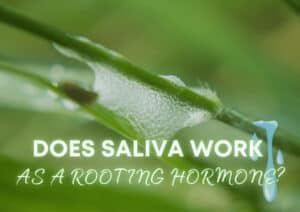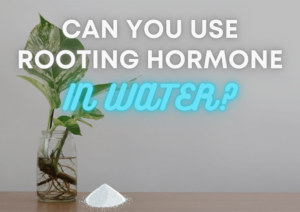Is Rooting Hormone Poisonous To Cats & Dogs?
- Chris Dosser with the help of an A.I. assistant
- March 25, 2023
If you buy something using the retail links in our articles, sometimes we earn a small affiliate commission. This does not impact the products we recommend.
Rooting hormone is a very common substance in plant-loving households, especially among avid propagators. Its purpose is to encourage faster rooting of various plant cuttings. Fresh cuttings are fragile until they root, as they cannot take in the nutrients they need. As such, many growers and enthusiasts find rooting hormone to be an essential part of their arsenal.
For the most part, rooting hormone is touted as completely safe, a natural way to encourage growth without harming plants. But pet owners who wish to use the product may not be as convinced. After all, dogs and cats have stomachs and digestive systems that are much more sensitive than humans.
Rooting hormone is not usually toxic or poisonous to cats or dogs, though some brands may have additives that do make them dangerous. The main active ingredient, auxin is not necessarily harmful, however 99.9% of the mass of a rooting hormone mixture is composed of other inert ingredients. If a cat or dog does consume some rooting hormone, it’s probably a good idea to consult with a vet to be safe.
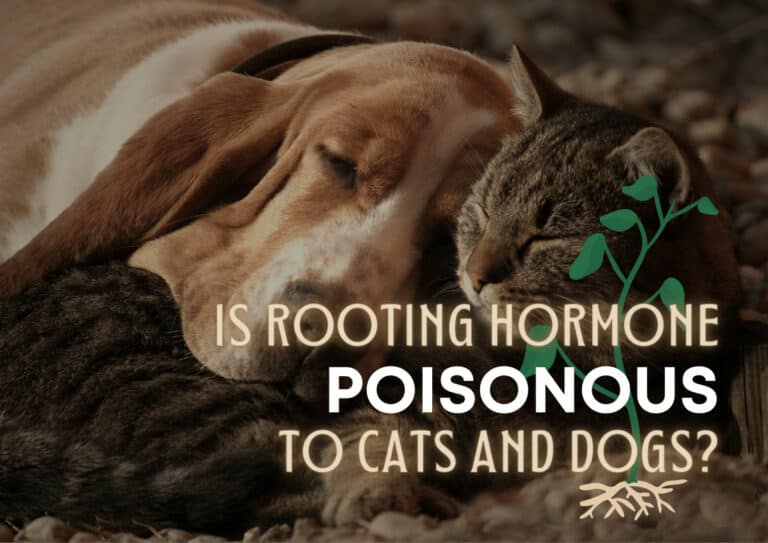
What is the active ingredient in rooting hormone?
Rooting hormones work by mimicking real-life hormones that naturally occur in plants, known simply as auxins, which aid in regulating plant growth. Artificial rooting hormone aims to promote the growth of adventitious roots, which it accomplishes by copying auxins.
Two auxins occur naturally in plants. They are Indole butyric acid and Indole-3-acetic acid, or IBA and IAA. Sadly, neither of these auxins lasts for very long, and though they help induce root growth, they can quickly break down when exposed to light. This is why rooting hormone is often used.
Commercially produced rooting hormone’s active ingredient is the man-made alpha-Naphthalene acetic acid, or NAA. NAA does an excellent job at mimicking IAA, as it is made up of a similar structure. It also doesn’t break down too quickly, and after applying to a plant, it can induce root growth faster and more reliably. Some rooting products may also use the man-made growth hormone 2,4-D, but this is mostly for tissue-related growth.
While it’s certainly an unusual chemical, these active ingredients are not inherently toxic to animals. They can cause gut irritation, as they are not naturally meant to be consumed, and can have mild adverse effects, but they are not dangerous in most cases.
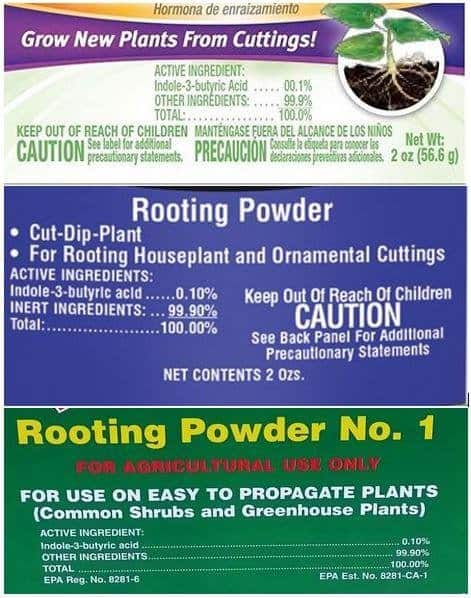
What should I do if my cat or dog consumes rooting hormone?
First, remove the jar of rooting hormone, or the plant or vase that has been dusted with rooting hormone, from your pet’s reach. Then, quickly check the bottle of rooting hormone for its active ingredients. Most rooting hormones will use various proprietary inactive ingredient chemicals, and it’s important to know what they are.
It’s often better to be safe than sorry, so if you can, call your vet and ask about the ingredients on the bottle, or send your vet a picture of the label. If you choose to take your pet to a vet directly, bring the bottle of rooting hormone along so your vet can look it over. If the bottle of rooting hormone indicates that it is poisonous or hazardous to inhale or consume, it’s best to take a trip to the vet for peace of mind.
The danger of rooting hormone depends largely on the amount ingested. Small amounts, or drinking water with some rooting hormone in it, is unlikely to be a cause for concern. But if a pet has eaten a large amount of rooting hormone, a vet trip is absolutely necessary.
You should always monitor your pet after they eat or drink something unusual. If your pet displays strange or unusual behavior after consuming rooting hormone, such as moving stiffly, acting in pain, or growing unusually lethargic, take them to the vet.
If your pet behaves normally, there’s likely no problem, and the rooting hormone has not harmed them. You are also likely to see vomiting or diarrhea; don’t panic! This can be a normal reaction to consuming something unusual. After all, some cats vomit daily. Use your best judgment.
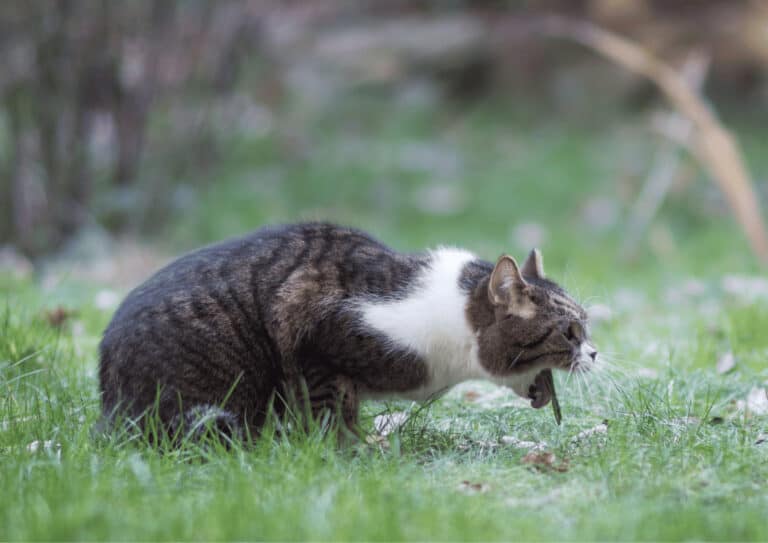
Why is my cat or dog vomiting after consuming rooting hormone, and what should I do about it?
Cats and dogs both have extremely sensitive stomachs and digestive systems. If you’ve ever suddenly changed their pet food or given them a brand new, completely pet-safe treat, you’ve probably seen them vomit as they attempt to get used to it.
Cats and dogs can vomit easily whenever something unusual is introduced to their digestive system. They even vomit as a result of completely pet-safe new foods. As such, the consumption of rooting hormone is certainly enough to trigger vomiting, and it doesn’t mean that they have been poisoned. However, you should also always check with a vet for extra peace of mind.
That said, it is still highly advisable to monitor your cat or dog’s vomiting after they’ve eaten some rooting hormone. In most cases, the vomiting is not abnormal, especially if it is mild, and it should stop over the next 12 to 24 hours.
Withhold water and food from your pet for an hour after vomiting to allow them to settle their stomachs. Then, gradually reintroduce small amounts of water to their water bowl over the next hour or so. If they vomit again, you can offer your cat a small amount of plain Pepcid AC, following recommended dosage requirements. You can offer small amounts of simple food if they do not vomit again.
If vomiting continues for more than two hours, bringing your pet to the vet is a good idea. Many animals struggle to stop vomiting on their own, and they may need a prescribed stomach-soothing medication to help them recover from nausea. Once again, you should bring the bottle of rooting hormone with you so the vet can check it for causes for concern.
Are there pet friendly alternatives to rooting hormone?
There are very few true, reliable alternatives to rooting hormone, period. The only promising, research-backed option is coconut water, which has been found to induce rooting at similar rates to man-made rooting hormones. To use this, let your stem cuttings sit in juice freshly extracted from mature coconuts for four to six hours before planting.
Do note that coconut water has high amounts of potassium in it, which can still pose a danger to pets if they drink a large amount. As such, you should still keep your plant cuttings out of reach of your pets anyway.
Other common alternatives to rooting hormone are aloe vera, willow water, and vermicompost tea, all of which have effectiveness backed by research. Unfortunately, these three are toxic to dogs and cats and should not be ingested.
You may have heard some growers using products such as turmeric, apple cider vinegar, cinnamon, and honey as rooting hormones. However, these items do not actually facilitate rooting. They can prevent infection and deter pests, thus increasing survivability, but they don’t actually speed up the process.
Before you go…
Reminder! Not all rooting products are made equal. Some do, indeed, have potentially more toxic ingredients. Still, most well-respected rooting products are entirely safe to pets, as long as they’re not consumed in large amounts.
These articles will help you up your propagation game using rooting hormone:
How should you use rooting powder when propagating succulents?

Chris Dosser
Co-Founder of Eden Indoors
Chris is a self-taught horticulturist with over a decade of experience caring for houseplants and creating lush, thriving indoor oases. He specializes in Monstera, and by self admission has a serious problem with buying and propagating rare indoor plants!
Similar Posts
Does Saliva Work As A Rooting Hormone? Examining The Science Behind The Claim
Can you use your own saliva to propagate plants? This blog article explores the science behind rooting hormones and whether saliva is a viable option.
Can You Use Rooting Hormone In Water Propagation? Exploring Effective Techniques
Rooting hormone for plants is most commonly applied in a powder or gel form, but can either of these be used in the process of water propagation?

